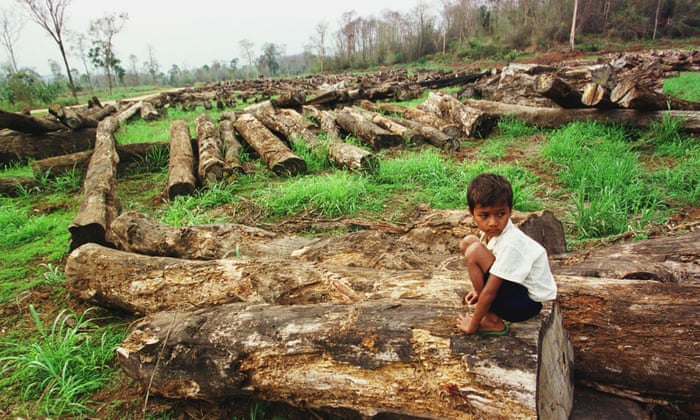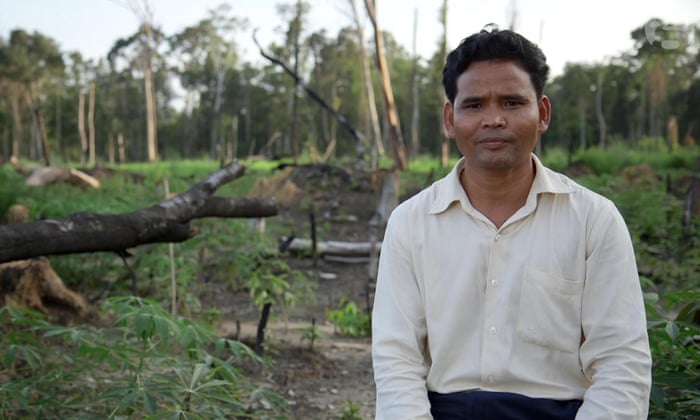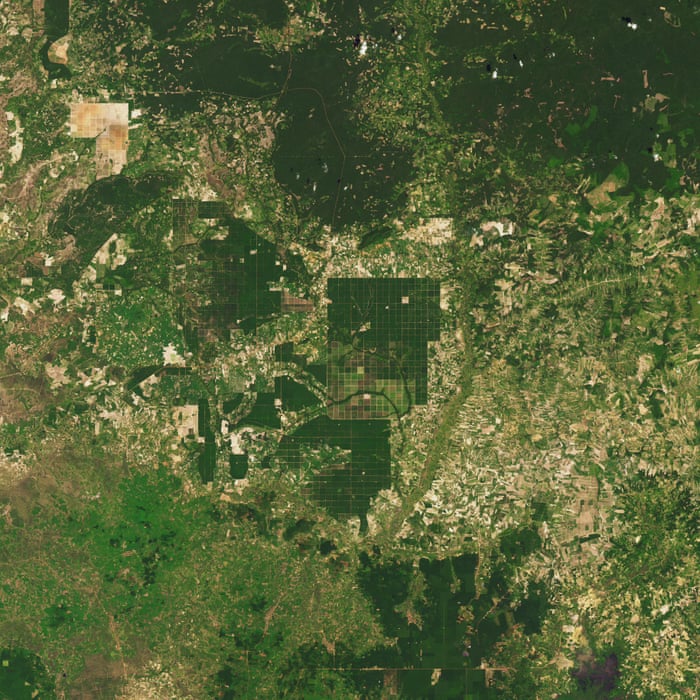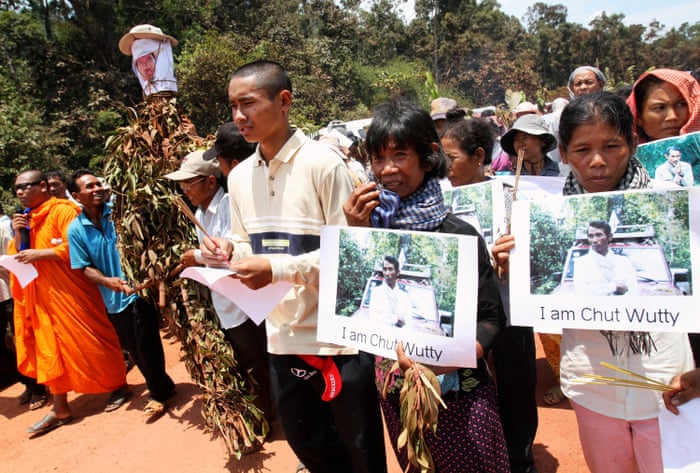 |
| In the 12 years to 2013, Cambodia had the world’s highest deforestation rate. Photograph: David Longstreath/AP |
'I could be arrested or killed': the activists fighting to save Cambodia's forests
Timber tycoons are collaborating with Cambodian officials to strip Prey
Lang forest. John Vidal meets the activists risking their lives to stop
deforestation
The Guardian | 16 February 2017
WATCH VIDEO: The fight to save Cambodia’s forests.
 |
| Leng Ouch won the world’s leading environmental prize for his activism. Photograph: Max Duncan |
 |
| Satellite image showing deforestation in Cambodia. Photograph: NASA'S Earth Observatory |
 |
| People march to the killing site of Cambodian anti-logging activist Chut Wutty in Koh Kong province in 2012. Photograph: Alamy |
We
crouch in a shallow trench deep in Cambodia’s Prey Lang forest. The
flies bite and we face walls of fallen trees. Fifty yards away a tall
fence surrounds a secret logging camp which forestry investigator Leng Ouch has identified with a drone.
Armed guards bar entry to the camp, which Leng says is owned by a
relation of a prominent member of government; so he follows the fence
until he finds a gap. Slipping into the large timber yard, he darts from
one large stack of logs to another, dodging behind idle bulldozers, log
stackers, trucks, tractors and a sawmill. He photographs each pile to
record numbers, tree sizes and species.
And then an alarm goes off. Has Leng been caught? If so, he is
certain to be beaten up, and probably imprisoned. The consequences of
his being found are dire. The forestry industry and some government
officials have made Cambodia’s leading forestry corruption investigator a
wanted man.
We text him from the ditch, but there is no response.
One hour later and we are increasingly certain that Leng has been
detained. We leave the ditch fearful of what may have happened and
approach the main gate, hoping to meet the head of the camp to plead on
his behalf.
But then Leng appears behind us. He had escaped the camp by crawling
out of the forest and hiding deep in a swamp until he thought they had
stopped looking for him.
For Leng, a lawyer who set up the Cambodian human rights taskforce,
defending what remains of the vast Prey Lang forest is a fraught
mission in a dangerous country. For years now, he has meticulously
documented and exposed how powerful timber tycoons have colluded with
senior politicians and the Cambodian officials to systematically strip
Prey Lang, using agribusiness and mining as a cover. As a direct result
of his and others’ work, the government has been forced to crack down on
corruption and illegal logging.
To get the information needed to expose the collusion between timber
companies and powerful politicians he has posed as a labourer, a timber
dealer, a driver, a tourist, and even as a cook. The human rights
defender has uncovered land grabbing by Chinese and western
corporations, illegal logging operations conducted by Cambodia’s biggest
timber magnates, smuggling of precious wood, and widespread corruption
within the national and local authorities.
It is dangerous work. His friend and colleague Chut Wutty was killed investigating an illegal logging site in the Cardamom mountains of south-west Cambodia in 2013.
Since then, forest activist Phan Sopheak, 25, was hacked as she slept,
and others have been killed as they try to investigate a corrupt trade.
“I know that my life and even my family is at risk. I could be
criminally charged and arrested or get killed, [but] I still try to save
the forest,” Leng says.
Leng has witnessed the rape of Cambodia’s forests in just a few
decades. Satellite images show how dozens of huge “economic land
concessions” handed out in the early 2000s have dissected south-east
Asia’s largest lowland forest. In the 12 years to 2013 Cambodia had the
world’s highest deforestation rate, in that time losing 1.5m hectares of
forest to logging and land clearance, making it one of the countries
with the highest deforestation rate in the world.
But it is a human rights as well as an ecological tragedy, with
implications for climate change, flooding and wildlife, he says. Around
350,000 people live in the greater Prey Lang area, and most depend on
the forest for a living. As well as precious rosewood and other luxury
timber, the logging companies have targeted hundreds of thousands of
resin trees which communities traditionally tap for sealants and the
perfume industry.
“The timber is being stolen from people who have looked after it for
years. The forest is decreasing day by day,” says Leng, who last year
was awarded a Goldman prize – or “green Oscar” – for his defence of Cambodia’s forests.
“The government and high-ranking officers are destroying it
completely,” he wrote to the Guardian recently. “I am surrounded by
armed forces. I am incapable to protect the forest alone. I was shocked
when I saw the big trees being cut down. Almost of all protected forest
are being destroyed when high ranking and powerful people are embroiled
with timber business.
“Timber business is a mafia business. They don’t care about the law,
environment or livelihood of people. They bribe government officials for
permission to cut and transport the timbers to Vietnam and China.”
He and other forest activists argue that the US, EU and other donor
countries do not seek to stop the deforestation, offering instead only
token support for community groups to monitor and apprehend illegal
loggers.
“The main problem is the US, EU and other donors dare not urge
government to stop sawmill operations. Some donors just waste money and
never do anything against the sawmills,” he says.
Stung by international criticism and mounting grassroots opposition,
the Cambodian government last year set up new conservation areas in Prey
Lang, theoretically protecting a further 300,000 hectares of the forest.
In addition, a national anti-deforestation “crackdown” committee led by
a military police general was equipped with machine guns, helicopters
and rocket launchers to stop illegal logging.
Leng dismisses the initiative as toothless. “The crackdown commission
group went for several days into the Prey Lang forest [but] the
security guards of the sawmills did not allow them to go inside. It
showed that the government has no commitment to raid sawmills,” he says.
Indeed, the number of illegal logging sites found by communities in the
forest continues to grow, he says. “No one dares to fight against
sawmill operating there, some sawmills paused for short time during the
crackdown mission ordered by prime minister in early 2016 but they have
now started to cut all species of tree again. Some huge sawmills owned
by powerful and influential people are still operating and government
does nothing against them.”
Instead, it is left to grassroots groups and communities to police their forest. Under the banner of the Prey Lang community network,
hundreds of young people using motorbikes, smart phones and cameras
regularly patrol the dirt tracks near their villages to look for
loggers. If they find them, they seize the sawn wood, and confiscate
chainsaws and logging machinery.
With a dozen young volunteer forest monitors, we take to the
motorbikes, following forest tracks, crossing makeshift bridges and
flooded fields. In a village on the southern edge the forest we meet
leaders who told Leng how a company had moved into their area three
years ago.
“They have taken our farmland, our resin trees have gone, they have
destroyed a temple and filled in lakes,” says Meas Mon, a village
leader. “Life is much harder now. There was no consultation by the
company or by government. Our land was just grabbed,” she says.
“We have uncovered more than 2,000 cases of forestry crime so far
this year. They took about 20,000 hectares. They cut down the rosewood
and other valuable trees. We complained to the authorities and the
police but nothing changed. So we started a people’s movement.
“Now we patrol every week. Last month we confiscated about 250 planks of
valuable wood, worth at least $20,000 (£16,000) and 49 chainsaws. Last
year we captured two bulldozers used by loggers to get into the forest,”
says Kuoy Lutsang. “The company can have its bulldozers back when we
get our land back.”
Three things are needed to stop the deforestation, says Leng. “It
needs the EU and US to urge the Cambodian government to shut down all
the sawmills. In addition the EU must stop its proposed voluntary
partnership agreement with neighbouring Vietnam – which will allow it to
export timber to Europe.
“The agreement is supposed to ensure Vietnam exports only
legally-felled wood, but Leng says it offers little protection for Prey
Lang. “I have found that Vietnam imports illegally felled timber from Cambodia. The EU always talks about climate change and the environment but why does it allow timber to be bought from Vietnam?”
The future is uncertain for both Leng and the once-mighty Prey Lang
forest. Unless the EU and US combine to put pressure on the Cambodian
government and its cronies, the trees will continue to fall, and the
human cost will mount.


Go replant the forest. GO!
ReplyDelete